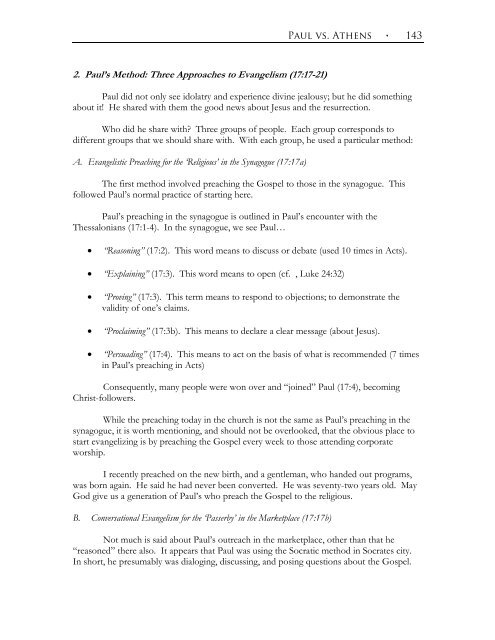0 jbtm vol. 6, no. 2 the proclamation of the gospel - Baptist Center for ...
0 jbtm vol. 6, no. 2 the proclamation of the gospel - Baptist Center for ...
0 jbtm vol. 6, no. 2 the proclamation of the gospel - Baptist Center for ...
Create successful ePaper yourself
Turn your PDF publications into a flip-book with our unique Google optimized e-Paper software.
2. Paul’s Method: Three Approaches to Evangelism (17:17-21)<br />
Paul vs. A<strong>the</strong>ns ٠ 143<br />
Paul did <strong>no</strong>t only see idolatry and experience divine jealousy; but he did something<br />
about it! He shared with <strong>the</strong>m <strong>the</strong> good news about Jesus and <strong>the</strong> resurrection.<br />
Who did he share with? Three groups <strong>of</strong> people. Each group corresponds to<br />
different groups that we should share with. With each group, he used a particular method:<br />
A. Evangelistic Preaching <strong>for</strong> <strong>the</strong> ‘Religious’ in <strong>the</strong> Synagogue (17:17a)<br />
The first method in<strong>vol</strong>ved preaching <strong>the</strong> Gospel to those in <strong>the</strong> synagogue. This<br />
followed Paul’s <strong>no</strong>rmal practice <strong>of</strong> starting here.<br />
Paul’s preaching in <strong>the</strong> synagogue is outlined in Paul’s encounter with <strong>the</strong><br />
Thessalonians (17:1-4). In <strong>the</strong> synagogue, we see Paul…<br />
• “Reasoning” (17:2). This word means to discuss or debate (used 10 times in Acts).<br />
• “Explaining” (17:3). This word means to open (cf. , Luke 24:32)<br />
• “Proving” (17:3). This term means to respond to objections; to demonstrate <strong>the</strong><br />
validity <strong>of</strong> one’s claims.<br />
• “Proclaiming” (17:3b). This means to declare a clear message (about Jesus).<br />
• “Persuading” (17:4). This means to act on <strong>the</strong> basis <strong>of</strong> what is recommended (7 times<br />
in Paul’s preaching in Acts)<br />
Consequently, many people were won over and “joined” Paul (17:4), becoming<br />
Christ-followers.<br />
While <strong>the</strong> preaching today in <strong>the</strong> church is <strong>no</strong>t <strong>the</strong> same as Paul’s preaching in <strong>the</strong><br />
synagogue, it is worth mentioning, and should <strong>no</strong>t be overlooked, that <strong>the</strong> obvious place to<br />
start evangelizing is by preaching <strong>the</strong> Gospel every week to those attending corporate<br />
worship.<br />
I recently preached on <strong>the</strong> new birth, and a gentleman, who handed out programs,<br />
was born again. He said he had never been converted. He was seventy-two years old. May<br />
God give us a generation <strong>of</strong> Paul’s who preach <strong>the</strong> Gospel to <strong>the</strong> religious.<br />
B. Conversational Evangelism <strong>for</strong> <strong>the</strong> ‘Passerby’ in <strong>the</strong> Marketplace (17:17b)<br />
Not much is said about Paul’s outreach in <strong>the</strong> marketplace, o<strong>the</strong>r than that he<br />
“reasoned” <strong>the</strong>re also. It appears that Paul was using <strong>the</strong> Socratic method in Socrates city.<br />
In short, he presumably was dialoging, discussing, and posing questions about <strong>the</strong> Gospel.


